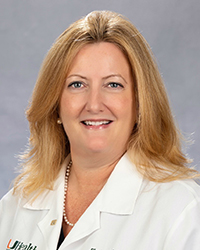Interested in Psychiatry?
Dear friends and colleagues,
The state-funded Memory Disorders Clinic (MDC) at the University of Miami Miller School of Medicine offers an in-depth learning experience that combines clinical and research experience in a vibrant, multicultural city with a diverse patient population – and South Florida’s celebrated sunshine, beaches, and climate.
At Jackson Memorial Hospital, trainees see geriatric patients with acute psychiatric conditions and provide care for inpatients. At the Miami VA, residents offer consultations in various settings – long-term care facilities, hospitals, and outpatient clinics. Our division continues to grow, adding talented psychiatrists and teachers. We’re continually seeking grants that allow us to expand research into Alzheimer’s disease and neurocognitive and neuropsychiatric conditions. This enables trainees to gain wide-ranging experience.
Many memory disorders clinics are led by neurologists, but ours is led by a geriatric psychiatrist – the same chosen field as our residents. This makes our program unique, ensuring our trainees receive a breadth and depth of learning that not only prepares them but positions them to excel in their role. Residents receive comprehensive training in the most innovative tools to assist with leading-edge diagnosis and the treatment of patients with Alzheimer’s disease and other neurodegenerative illnesses. This multidisciplinary setting allows trainees to work with neuropsychiatrists, neurologists, neuropsychologists, social workers, and patient caregivers and learn how to assist family members and other caregivers to facilitate the adjustment.
Just as we’re committed to exceptional patient care, we’re dedicated to training tomorrow’s leaders in the field. We nurture our trainees’ interests and development, allowing them to gain valuable experience from their work with complex patients and exceptional Miller School teachers, researchers, and mentors. Residents also take part in educating medical students and community providers, including respite care and unpaid family caregivers. Training goes beyond treating patients and doing innovative clinical and translational research.
I’m excited about the future of geriatric psychiatry – how we’re improving our ability to identify those at greatest risk for Alzheimer’s disease and related dementias, developing preventive measures, and seeking disease-modifying treatments that will ultimately lead to a cure. I’m passionate about our efforts to reach the underserved who aren’t receiving the care they need – as we’re doing through our work with the VA and a registry of Black people and other underrepresented populations at risk for developing Alzheimer’s disease and related disorders.
We’re not just looking for ways to prolong life. We’re looking to prolong the quality of life in aging – and we’re training the next generation of geriatric psychiatrists to lead the charge.
Sincerely
Elizabeth A. Crocco, M.D.
June is Alzheimer's & Brain Awareness Month
June is Alzheimer’s and Brain Awareness Month. According to the Centers for Disease Control and Prevention (CDC), about 6 million people are affected by Alzheimer’s Disease. Although the causes of Alzheimer’s are not yet fully understood, it is likely that there is not a single cause but rather several factors that can affect each person differently. There is growing evidence that healthy behaviors, which have been shown to prevent cancer, diabetes, and heart disease, may also reduce the risk for subjective cognitive decline. Learn more by visiting: https://www.cdc.gov/aging/publications/features/healthy-body-brain.html.
Use the Alzheimer’s Disease and Related Dementias Community Resources to help raise awareness on the early warning signs of Alzheimer’s Disease and other dementias! This tool provides information about community organizations and helpful online resources for individuals, families and their caregivers. Download it online at: https://www.healthymiamidade.org/wp-content/uploads/2021/03/ADRDs-CommunityResources-English-Spanish-Creole-MAR2021.pdf

